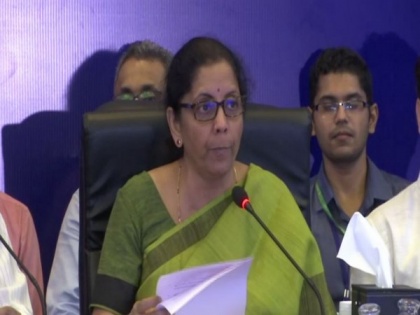GST decisions: Wet grinders to cost less, caffeinated beverages more
By ANI | Published: September 20, 2019 11:47 PM2019-09-20T23:47:23+5:302019-09-21T16:20:50+5:30
Finance Minister Nirmala Sitharaman on Friday announced the reduction of GST rates on a slew of goods including slide fasteners dried tamarind, plates made of leaves and wet grinders.

GST decisions: Wet grinders to cost less, caffeinated beverages more
Finance Minister Nirmala Sitharaman on Friday announced the reduction of GST rates on a slew of goods including slide fasteners dried tamarind, plates made of leaves and wet grinders.
However, caffeinated beverages will get expensive.
Addressing a press conference after 37th GST council meeting here, the minister announced that plates and cups made up of leaves/ flowers/bark will have nil GST as part of government's efforts to eliminate the usage of single-use plastic.
The rate changes will be effective from October 1.
GST rate has been reduced from 18 per cent to 12 per cent on parts of slide fasteners, from 18 per cent to 5 per cent on (marine fuel 0.5 per cent (FO) and 12 to 5 per cent on wet Grinders (consisting stone as a grinder)
It has been brought from five per cent to nil on dried tamarind and plates and cups made up of leaves/ flowers/bark.
The GST has been brought down from 3 per cent to 0.25 per cent on cut and polished semi-precious stones. The applicable rate has been brought to 5 per cent on specified goods for petroleum operations undertaken under Hydrocarbon Exploration Licensing Policy (HELP)
The minister announced exemptions from GST/IGST on - imports of specified defence goods not being manufactured indigenously (up to 2024), supply of goods and services to FIFA and other specified persons for orgsing the Under-17 Women's Football World Cup in India and supply of goods and services to Food and Agriculture Orgsation (FAO) for specified projects in India.
GST rates have also been increased from 5 to 12 per cent on goods falling under chapter 86 of tariff like railway wagons, coaches, rolling stock (without refund of accumulated ITC).
"This is to address the concern of ITC accumulation with suppliers of these goods," she said.
The minister said that GST rates have been hiked from 18 to 28 per cent +12% compensation cess on caffeinated beverages.
Referring to measures for Export Promotion, she said there will be an exemption from GST/IGST at the time of import on silver/platinum by specified nominated agencies, the supply of these metals by the specified nominated agency to exporters for exports of jewellery.
Diamond India Limited (DIL) will be included in the list of nominated agencies eligible for IGST exemption on imports of gold/ silver/platinum so as to supply at nil GST to jewellery exporters.
There will be a uniform GST rate of 12 per cent on polypropylene/polyethylene woven and non-woven bags and sacks of a kind used for the packing of goods (from present rates of 5/12/18 per cent).
The council also decided to provide GST concession in certain cases for a specific period. This includes an exemption to fishmeal for the period July 1, 2017 to September 30, 2019.
"There were doubts as regards taxability of fishmeal in view of the interpretational issues. However, any tax collected for this period shall be required to be deposited," she said.
There will be 12 per cent GST for the period July 1, 2017 to December 31, 2018, on pulley, wheels and other parts and used as parts of agricultural machinery.
Passenger vehicles of engine capacity 1500 cc in case of diesel, 1200 cc in case of petrol and length not exceeding 4000mm designed for carrying up to nine persons attract compensation cess of 1 per cent for petrol and 3 per cent for diesel.
"The council recommended same compensation cess rate for vehicles having these specifications (length and engine capacity) but designed for carrying more than 10 persons but up to 13 persons," she said. At present these vehicles attract compensation cess at the rate of 15 per cent.
She said aerated drink manufacturers shall be excluded from composition scheme.
The council approved option to pay GST at the rate of 18 per cent on transaction value at the time of disposal of specified goods for petroleum operations (on which concessional GST rate of 5 per cent was paid at the time of original supply) provided that the goods are certified by Director General Hydrocarbon(DGH) as non-serviceable.
It recommended restriction on refund of compensation cess on tobacco products (in case of inverted duty structure).
The council prescribed modalities for allowing concessions on spare parts imported temporarily by foreign airlines for the repair of their aircraft, while in India in transit in terms of the Chicago Convention on Civil Aviation.
There was also clarification about the GST rate in respect of certain goods. Mere heating of leguminous vegetables (gram/lentil) for removing moisture, or to soften and puff it or removing the skin, and not subjecting to any other processing or addition of any other ingredients (salt, oil etc.) would be classified under HS code 0713.
All "mechcal sprayers" falling under HS Code 8424 would attract 12 per cent GST.
Parts like solar evacuation tubes for solar power based devices like solar water heater, solar steam, generation systems, would be eligible to 5 per cent GST rate.
Exclusive parts and accessories suitable for use solely or principally with a medical device would fall in respective headings and attract GST at the concessional rate of 12 per cent.
Almond milk is classifiable under HS code 22029990 and attracts GST rate of 18 per cent. Imported stores for Navy would be entitled to exemption from IGST.
( With inputs from ANI )
Open in app